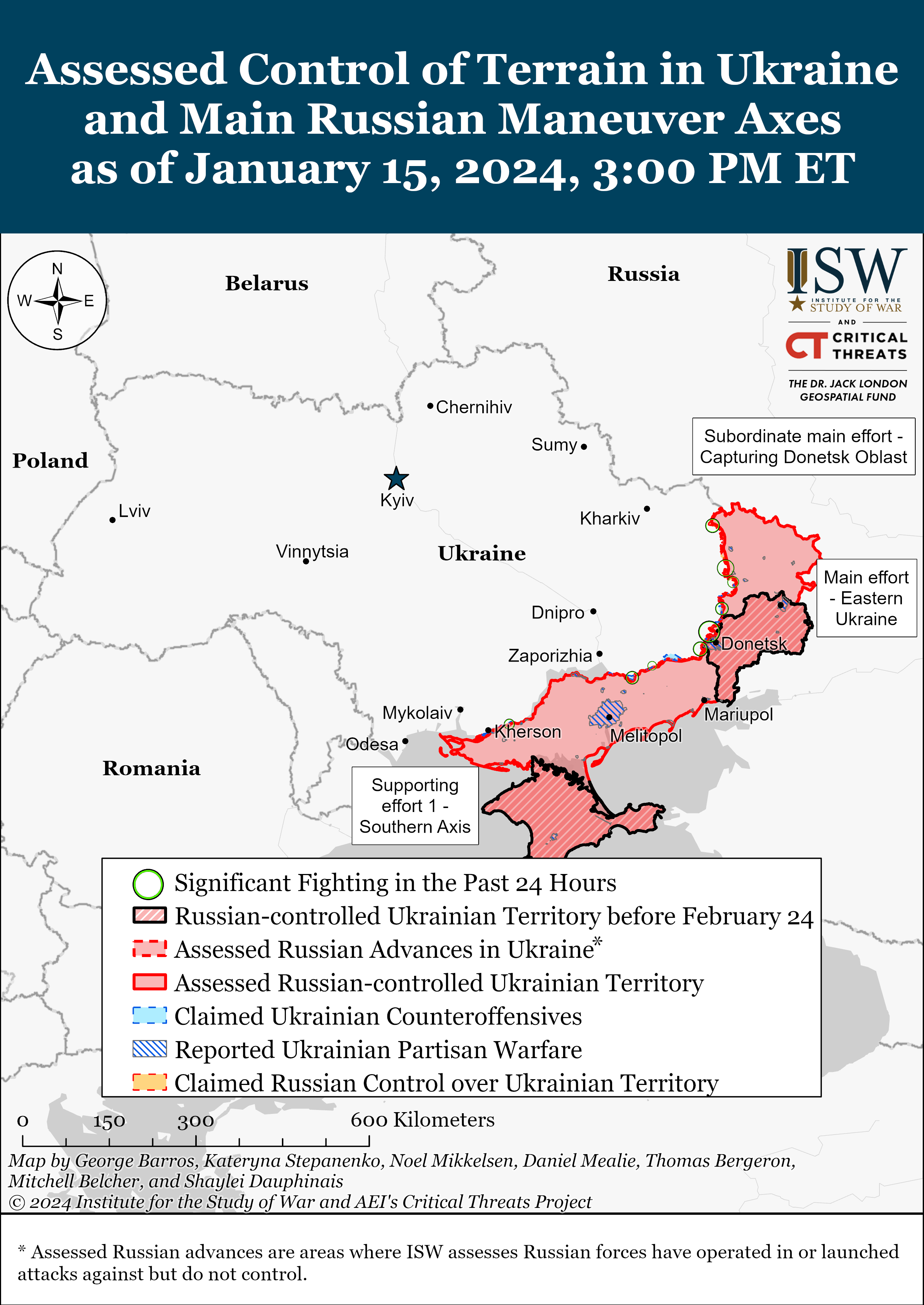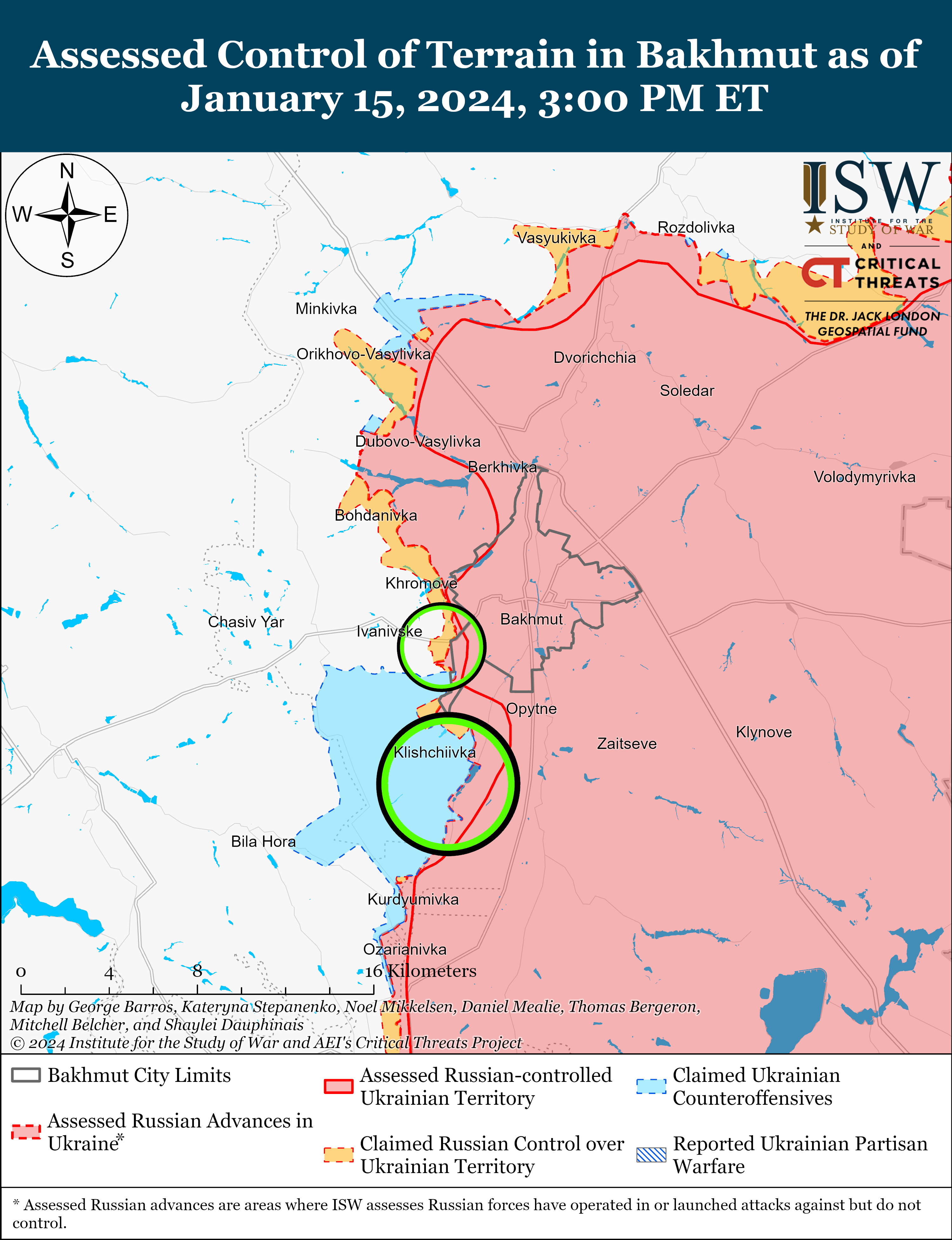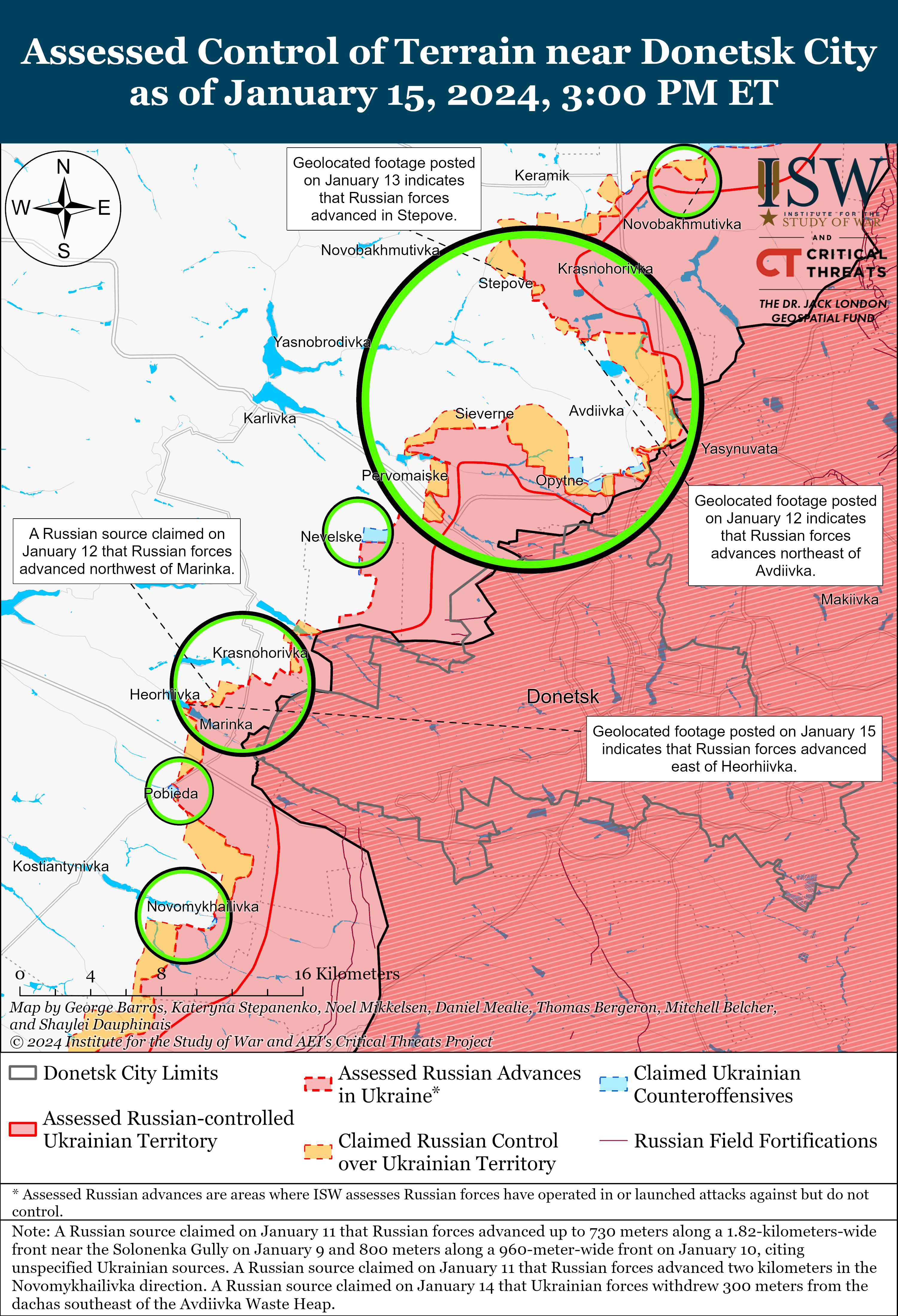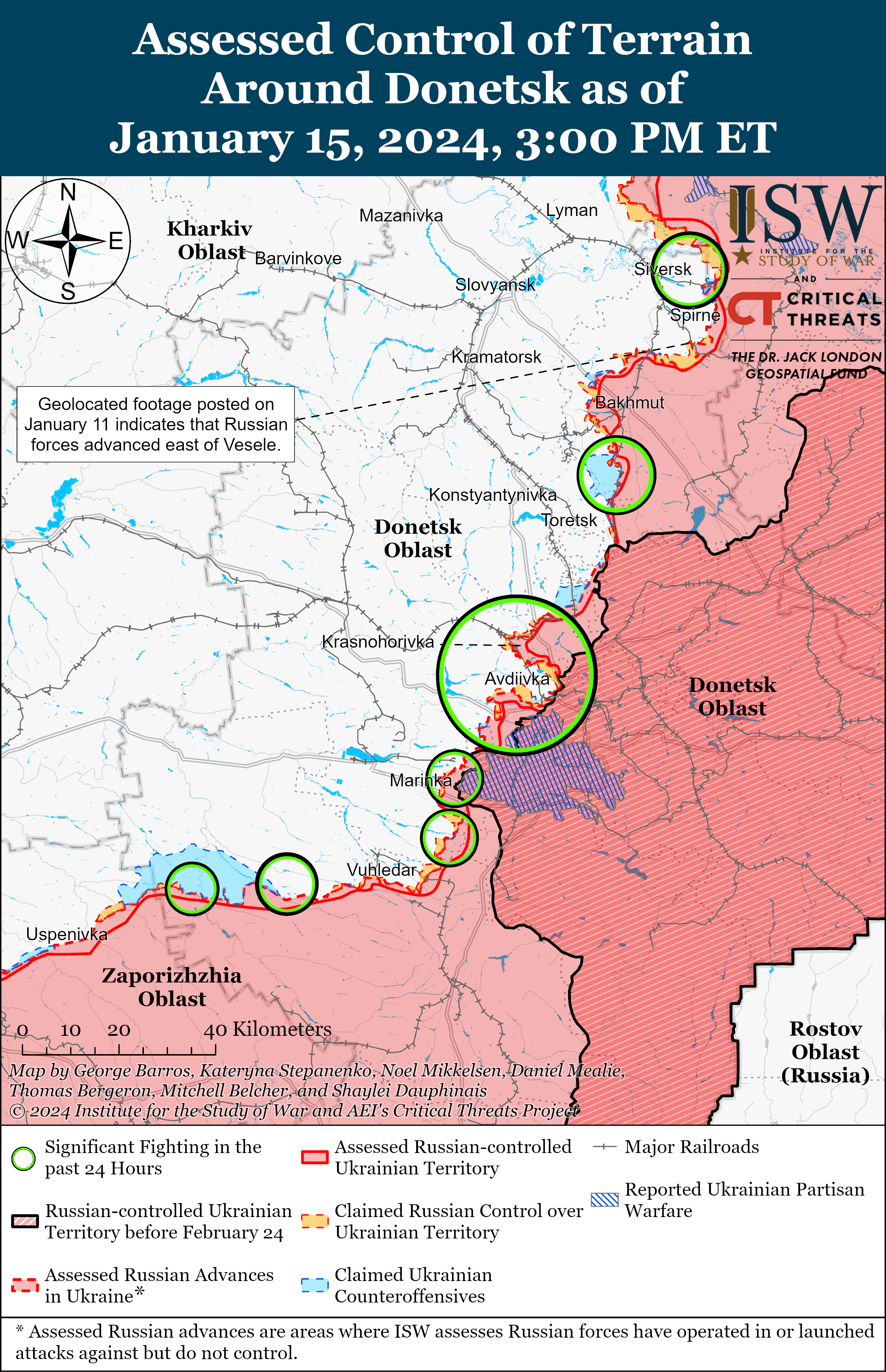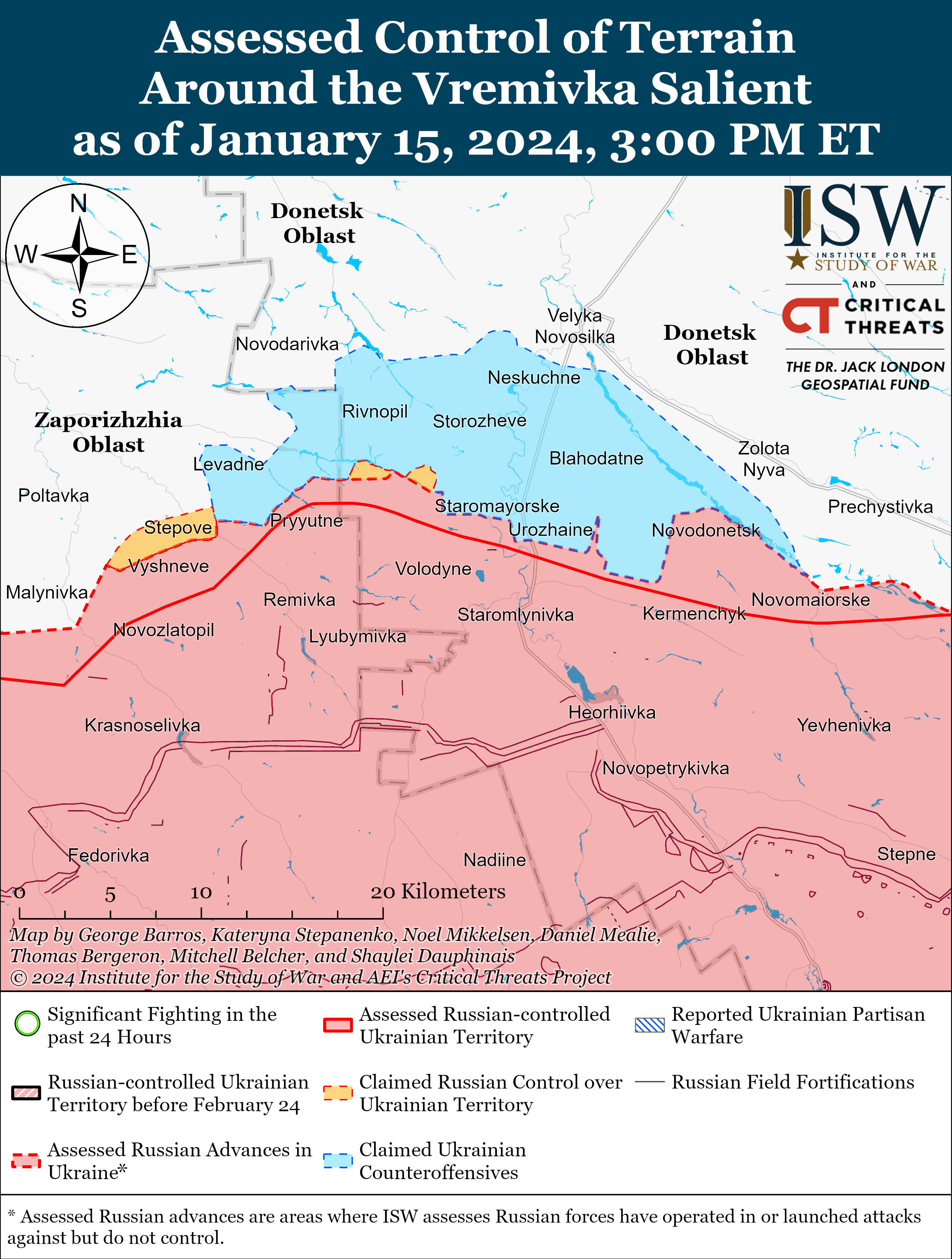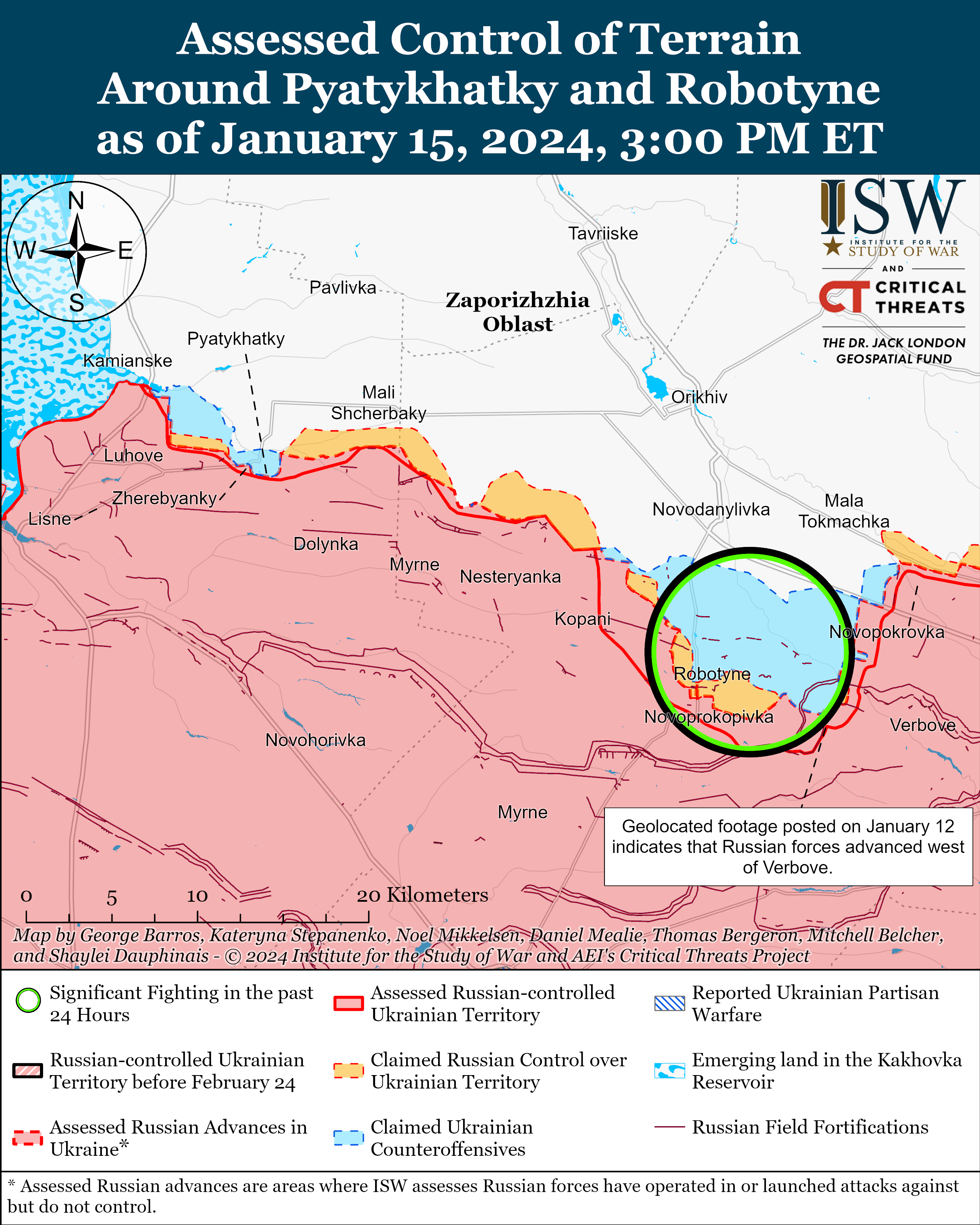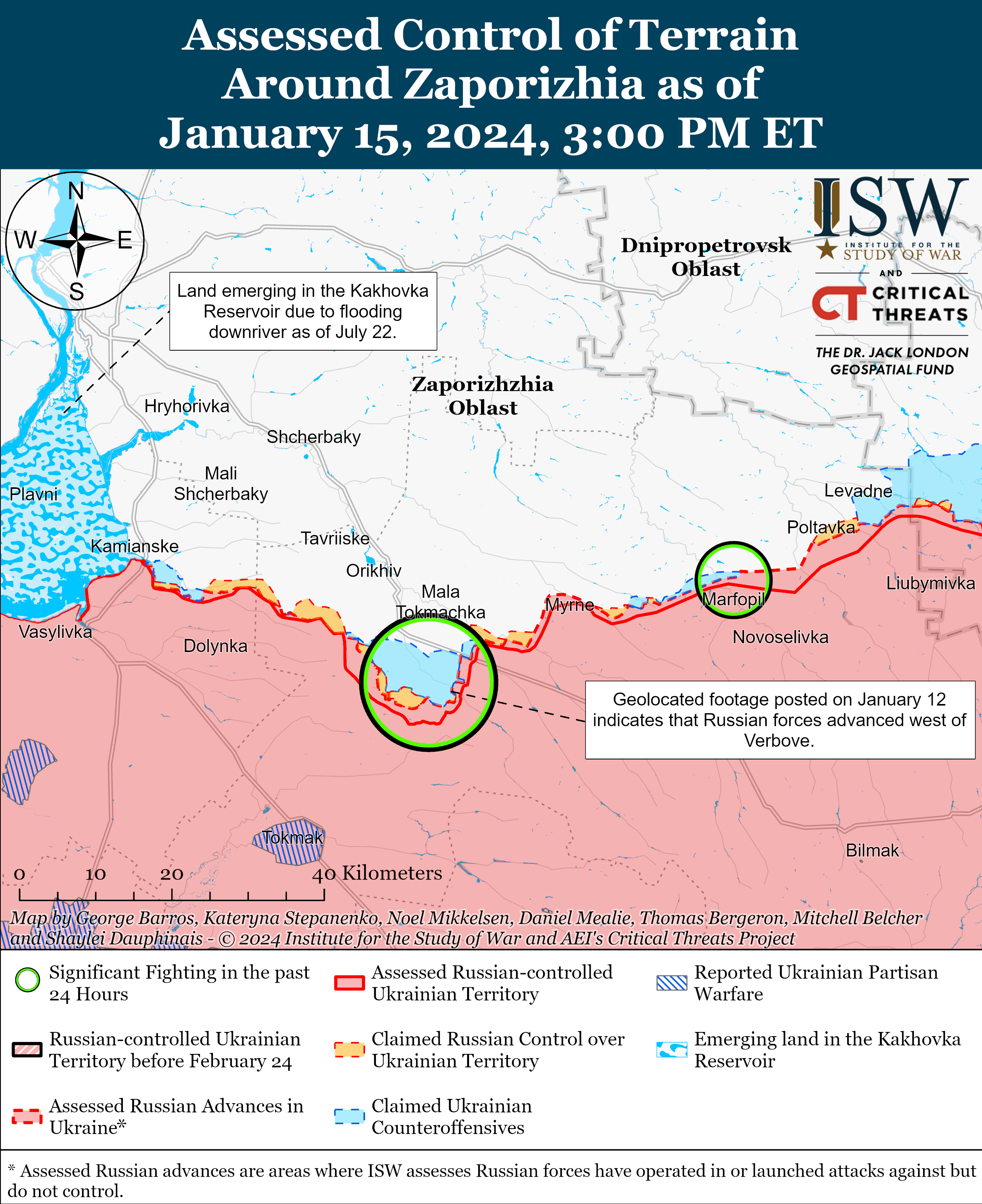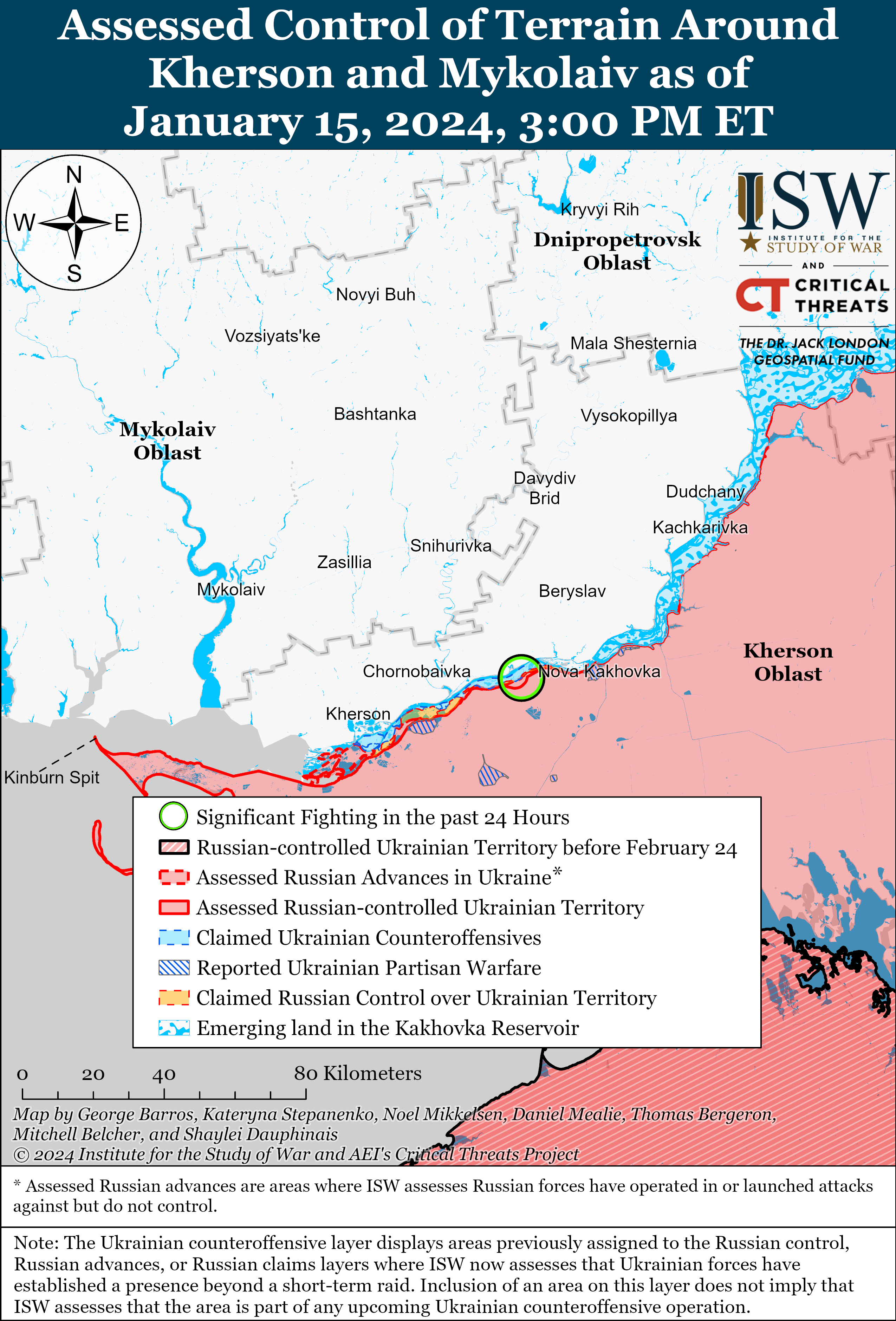Russian Offensive Campaign Assessment, January 15, 2024
Christina Harward, Nicole Wolkov, Grace Mappes, Kateryna Stepanenko, and Frederick W. Kagan
January 15, 2024, 9:00pm ET
Click here to see ISW’s interactive map of the Russian invasion of Ukraine. This map is updated daily alongside the static maps present in this report.
Click here to see ISW’s 3D control of terrain topographic map of Ukraine. Use of a computer (not a mobile device) is strongly recommended for using this data-heavy tool.
Click here to access ISW’s archive of interactive time-lapse maps of the Russian invasion of Ukraine. These maps complement the static control-of-terrain map that ISW produces daily by showing a dynamic frontline. ISW will update this time-lapse map archive monthly.
Note: The data cut-off for this product was 2:30pm ET on January 15. ISW will cover subsequent reports in the January 16 Russian Offensive Campaign Assessment.
Note: ISW has added a new section on Ukrainian defense industrial base (DIB) efforts to the daily Russian Offensive Campaign Assessment to track the development of Ukraine’s DIB and the international support for Ukraine’s DIB efforts. ISW will be publishing its assessments in this section based on public announcements, media reporting, and official statements.
Ukrainian officials announced that Ukrainian forces destroyed a Russian A-50 long-range radar detection aircraft and severely damaged an Il-22 airborne command post aircraft on the night of January 14.[1] Ukrainian Commander-in-Chief General Valerii Zaluzhnyi posted flight tracking footage indicating that Ukrainian forces struck the A-50 and Il-22 over the Sea of Azov.[2] Ukrainian Air Force Spokesperson Colonel Yuriy Ihnat stated that Ukrainian forces were able to hit two targets while initially targeting the A-50.[3] Ihnat stated that the Ukrainian strike forced the Il-22 to land in Anapa, that the Il-22 is likely irreparable, and that there were wounded and dead among its crew. Ukrainian and Russian sources posted a photo of the damaged Il-22 at the airfield in Russia.[4] Ukrainian military officials, including Southern Operational Command Spokesperson Colonel Nataliya Humenyuk, stated that the A-50 directed Russian strikes against Ukrainian targets, such as air defense systems and aviation.[5] Humenyuk stated that the destruction of the A-50 will at least postpone future Russian missile strikes on Ukraine.[6] Ukrainian military observer Kostyantyn Mashovets stated on January 3 that Russia began constant sorties of A-50 aircraft due to the threat of Ukrainian strikes against Russian military infrastructure in Crimea, including Black Sea Fleet (BSF) assets.[7] Valery Romanenko, a leading researcher at the Ukrainian State Aviation Museum of the National Aviation University, stated that the loss of the A-50 and members of its crew is “very painful” for Russia since a large part of the A-50’s crew is highly specialized and must undergo several years of training.[8] Ukraine’s Southern Operational Command stated that Russia had only three A-50s in service out of a total of six prior to this strike.[9]
The Russian information space largely denied that Ukrainian forces struck the A-50 aircraft and instead strangely claimed that the aircraft was destroyed by friendly fire from Russian air defenses.[10] The A-50 is used to coordinate Russian air and possibly air defense activity, and the claim that Russian air defenses shot down the A-50 would amount to a calamitous failure on the part of Russian forces, if true. A Russian source that focuses on Russian aviation blamed Russian commanders who lack the proper background required for their positions.[11] The current commander of the Russian Aerospace Forces, Colonel General Viktor Afzalov, has an extensive background in Russian air defense operations.[12] Whether his lack of experience as a pilot poses any problems for Russian air operations, which is questionable, his experience as an air defender should have been appropriate to ensure that Russian forces do not shoot down their own airborne control aircraft. A Russian insider source claiming to be an employee of an unspecified Russian security structure claimed that unspecified Russian actors created a “duck” (a Russian term for a false claim) about how Russian forces shot down the A-50 to reassure Russian pilots that missions over the Black Sea and Sea of Azov are still safe and that human error was the cause of the incident.[13] It is unclear why Russian pilots should be more comfortable with the idea that their ground-based air defenders are so incompetent. Kremlin spokesperson Dmitry Peskov stated that he did not have any information about the downed aircraft and recommended that journalists clarify information about this with the Russian Ministry of Defense (MoD).[14] The Russian MoD has not made an official statement about the incidents as of this publication.
A senior Ukrainian intelligence official confirmed that Russian forces can generate forces at a rate equal to Russian monthly personnel losses, which is consistent with ISW’s assessment that Russian forces are able to conduct routine operational level rotations in Ukraine. Ukrainian Main Military Intelligence Directorate (GUR) Deputy Chief Major General Vadym Skibitskyi stated that Russia recruits about 30,000 personnel per month, which the Russian military uses to replenish losses and form reserve regiments.[15] Ukrainian military analyst Colonel Petro Chernyk similarly assessed that Russia is able to replace about 25,000 to 27,000 personnel per month and has a small ready professional reserve of mechanized, naval infantry, and airborne (VDV) assault units staffed at 10 to 15 percent of its total capacity.[16] Skibitskyi and Chernyk’s figures are consistent with the ISW’s assessment that Russian forces can conduct operational level rotations in most sectors of the frontline.[17] Chernyk stated that Russia has between 1.5 million and seven million people in its general mobilizable reserve (“personnel mobilization resource” or zapas) composed of men that could be mobilized regardless of prior military experience, as distinct from the far smaller ready and professional reserve (“personnel mobilization reserve“) that should, in theory, be more militarily proficient on mobilization.[18] Skibitskyi stated Russia is highly unlikely to conduct any form of official mobilization prior to the March 2024 Russian presidential election.[19] Skibitskyi reported that Russia would need to conduct “mobilization” (likely referring to large-scale mobilization) to establish a “powerful strategic reserve.”[20] Skibitskyi stated that it is too early to comment on whether Russia intends to conduct “mobilization” after the March 2024 Russian presidential election, however.[21]
Skibitskyi indicated that international sanctions are constraining Russian missile and drone production as Russian forces likely continue to adapt their missile and drone strike packages in an effort to penetrate Ukrainian air defenses. Skibitskyi stated that recent Russian strikes have targeted Ukrainian defense industrial base (DIB) enterprises, military headquarters, and military control systems and units on the frontline, consistent with ISW’s observations.[22] Skibitskyi reported that Russian forces have recently started launching Shahed drones against frontline areas, whereas Russian forces previously used Shahed drones to target rear DIB enterprises.[23] ISW observed Russian forces using Shahed drones to target frontline areas starting in late December 2023, and Ukrainian forces intercepted a lower number of drones likely due to lower levels of Ukrainian air defense coverage or air defense coverage not optimized for intercepting drones near the frontline.[24] Skibitskyi noted that Russia can produce about 330 to 350 Shahed drones per month but that these numbers largely depend on Russia’s ability to acquire electronic components such as microchips and circuits abroad.[25] Skibitskyi reported that Russia is using Chinese-made engines in Shahed drones.[26] Skibitskyi also stated that Russian forces had not included Kh-101 or Kalibr cruise missiles in strike series since mid-September 2023 likely as part of efforts to build up a missile reserve.[27] Skibitskyi reported that the Russian DIB may be able to produce 115 to 130 missiles suitable for strategic strikes against Ukraine per month but that the actual monthly production output varies because Kh-47 Kinzhal ballistic missiles and Kh-101 and Kalibr cruise missiles require many foreign components blocked under international sanctions.[28] Skibitskyi stated that Russia is unable to produce analogues of these foreign components domestically. ISW has assessed that Russia is likely attempting to acquire more ballistic missiles from abroad because ballistic missiles may be more successful in striking Ukrainian targets in some circumstances.[29] Russia may also be intensifying efforts to source ballistic missiles from abroad due to increased difficulties in the Russian domestic production of Kh-47 Kinzhal ballistic missiles. Skibitskyi reported that Russia can produce Kh-31, Kh-34, Kh-29, and Kh-59 air-to-air missiles using mainly domestic components and that Russian forces use Kh-31 and Kh-59 missiles to target Ukrainian air defense systems and radar stations during large strike series.[30]
German outlet BILD reported on classified German documents describing a hypothetical scenario to prepare for a possible future conflict between NATO and Russia. Developing such scenarios, which are usually classified, is a normal task for professional military staff. BILD reported on January 14 that it obtained classified documents from the German Ministry of Defense (MoD) that outline “Alliance Defense 2025,” a scenario of a possible “path to conflict” between Russia and NATO that begins in February 2024.[31] BILD stated that the hypothetical scenario includes Russia’s movement of troops and equipment to Kaliningrad Oblast amid claims of an impending NATO attack and artificial Russian-created “border conflicts” and “riots” in states near the Suwalki Gap. A German MoD spokesperson accurately told BILD that “considering different scenarios, even if they are extremely unlikely, is part of everyday military business, especially training.”
Germany’s reported consideration of paths to a possible future conflict with Russia is not unwarranted given recent Russian threats towards NATO and the possibility of faltering Western aid to Ukraine. Russian officials and milbloggers largely dismissed the BILD report as rumors.[32] Russian officials, including Russian President Vladimir Putin, however, have recently and consistently threatened NATO, and Kremlin-affiliated actors appear to be attempting to sow instability and set information conditions for possible future aggressive Russian actions against NATO member states and their neighbors, although not on anything like the timeline suggested by the scenario BILD described.[33] ISW continues to assess that Western aid to Ukraine remains crucial as Ukraine’s inability to hold off the Russian military could allow Russian forces to push all the way to western Ukraine along the border with NATO states, which would very likely present NATO with challenging and expensive new defense requirements.[34]
Ukrainian President Volodymyr Zelensky arrived in Switzerland on January 15 to discuss aspects of the Ukrainian peace plan and support for Ukraine with global leaders at the Davos World Economic Forum from January 15 to 19. The World Economic Forum opened in Davos, Switzerland, on January 15, and Zelensky stated that he will hold bilateral meetings with representatives of NATO and European Union (EU) countries.[35] Zelensky stated that Ukraine and Switzerland have begun preparations for the Global Peace Summit that could be held in Switzerland and that he wants China to be part of these discussions.[36] Ukrainian Presidential Office Head Andriy Yermak stated that the Ukrainian delegation to Davos met regarding five aspects of the Ukrainian peace plan: the withdrawal of Russian forces to Ukraine, Russian accountability for its violations of international law, environmental security, prevention of escalation and recurrence of war, and confirmation of the end of the war.[37] Ukrainian Defense Minister Rustem Umerov proposed on January 14 to create an international working group of defense ministers and national security advisors about a Russian military withdrawal from Ukraine.[38] The Ukrainian Ministry of Justice announced that Ukraine and Switzerland signed a joint communique on January 15 agreeing that Ukrainian security is an inseparable part of regional and global security and that the international community’s goal is to end the war and overcome the crises that the war caused.[39]
Ukrainian and Swiss officials also discussed reconstruction and repatriation efforts. Zelensky met with Swiss President Viola Amherd and various factional representatives of the Swiss Federal Assembly on January 15 about Swiss support for Ukraine, reconstruction efforts, and the Ukrainian peace plan.[40] Amherd announced that Switzerland will provide 1.5 billion francs ($1.75 billion) for Ukrainian reconstruction efforts in 2025-2028.[41] Ukrainian Verkhovna Rada Human Rights Commissioner Dmytro Lubinets stated in Davos on January 14 that 517 Ukrainian children and 2,828 adults, including 150 civilians, have returned to Ukraine from Russia and called on the international community to help return all Ukrainians to Ukraine.[42]
A North Korean delegation including North Korean Foreign Minister Choi Song Hui arrived in Moscow on January 14 for an official state visit to Russia on January 15 to 17.[43] Russian Ministry of Foreign Affairs (MFA) Spokesperson Maria Zakharova stated that Choi will meet with Russian Foreign Minister Sergei Lavrov on January 16.[44] Kremlin Spokesperson Dmitry Peskov stated that Russia intends to develop a partnership with North Korea in “all areas” and that the Kremlin expects Lavrov’s and Choi’s negotiations to be fruitful.[45] Ukrainian Main Military Intelligence Directorate (GUR) Deputy Chief Major General Vadym Skibitskyi stated that Russia’s defense industrial base (DIB) cannot produce enough artillery ammunition to sustain Russia’s pace of fire and that North Korea delivered one million rounds of artillery ammunition to Russia in September-November 2023.[46]
Russia and Iran are preparing to sign a Grand Interstate Treaty to further develop Russian-Iranian military-technological cooperation.[47] Russian Defense Minister Sergei Shoigu and Defense and Iranian Armed Forces Logistics Minister Brigadier General Mohammad Reza Ashtiani reportedly discussed bilateral military and military-technical cooperation during a phone call on January 15, and both sides are reportedly preparing to sign the Grand Interstate Treaty within an unspecified timeframe.[48] Both sides emphasized their commitment to the fundamental principles of Russian-Iranian relations – including unconditional respect for each other’s sovereignty and territorial integrity – which will be confirmed in the upcoming Grand Interstate Treaty. Shoigu noted that Moscow and Tehran are consistently increasing their cooperation in the interest of building a “truly equal multipolar world.” Russian Foreign Minister Sergei Lavrov similarly spoke with Iranian Foreign Minister Hossein Amir Abdollahian about the progress of the new interstate agreement and a number of bilateral cooperation topics involving trade, economy, transport, and logistics during a phone call on January 15.[49] Lavrov and Abdollahian reiterated that Russia and Iran are preparing to codify different fundamental principles of Russian-Iranian relations in the new Grand Interstate Treaty.[50] Ukrainian Main Military Intelligence Directorate (GUR) Deputy Chief Major General Vadym Skibitskyi stated in an interview published on January 15 that Iran wants to increase military-technical cooperation with Russia and hopes to acquire Su-34 fighter aircraft, training aircraft, and radar stations.[51]
The Kremlin is intensifying censorship measures to limit criticism of the Russian war effort in Ukraine ahead of the March 2024 presidential election. Russian State Duma deputies from the ruling United Russia party proposed a draft bill that would allow the Russian government to confiscate property from individuals convicted of spreading “fake” information about the Russian military.[52] Russian opposition media sources reported on Russian investigations and arrests for allegedly spreading “fake” information about the Russian military, including specific cases targeting an opposition journalist and the wife of a mobilized individual.[53] The relatives of Russian mobilized personnel have increasingly complained about the Russian military’s treatment of mobilized personnel, and the Kremlin likely wants to silence concerned relatives to maintain good appearances ahead of the presidential election, as ISW has previously assessed.[54]
Key Takeaways:
- Ukrainian officials announced that Ukrainian forces destroyed a Russian A-50 long-range radar detection aircraft and severely damaged an Il-22 airborne command post aircraft on the night of January 14.
- A senior Ukrainian intelligence official confirmed that Russian forces can generate forces at a rate equal to Russian monthly personnel losses, which is consistent with ISW’s assessment that Russian forces are able to conduct routine operational level rotations in Ukraine.
- Skibitskyi indicated that international sanctions are constraining Russian missile and drone production as Russian forces likely continue to adapt their missile and drone strike packages in an effort to penetrate Ukrainian air defenses.
- German outlet BILD reported on classified German documents describing a hypothetical scenario to prepare for a possible future conflict between NATO and Russia. Developing such scenarios, which are usually classified, is a normal task for professional military staffs.
- Ukrainian President Volodymyr Zelensky arrived in Switzerland on January 15 to discuss aspects of the Ukrainian peace plan and support for Ukraine with global leaders at the Davos World Economic Forum from January 15 to 19.
- A North Korean delegation including North Korean Foreign Minister Choi Song Hui arrived in Moscow on January 14 for an official state visit to Russia on January 15 to 17.
- Russia and Iran are preparing to sign a Grand Interstate Treaty to further develop Russian-Iranian military-technological cooperation.
- The Kremlin is intensifying censorship measures to limit criticism of the Russian war effort in Ukraine ahead of the March 2024 presidential election.
- Russian forces made confirmed advances west of Donetsk City and near Krynky amid continued positional fighting along the entire line of contact.
- The Donetsk People’s Republic (DNR) is reportedly forming a women’s drone operating detachment.
- The Ukrainian Main Military Intelligence Directorate (GUR) stated that Ukrainian resistance forces detonated a Russian military UAZ Patriot vehicle in occupied Melitopol, Zaporizhia Oblast, injuring four Russian personnel and killing an unspecified number of personnel.
We do not report in detail on Russian war crimes because these activities are well-covered in Western media and do not directly affect the military operations we are assessing and forecasting. We will continue to evaluate and report on the effects of these criminal activities on the Ukrainian military and the Ukrainian population and specifically on combat in Ukrainian urban areas. We utterly condemn Russian violations of the laws of armed conflict and the Geneva Conventions and crimes against humanity even though we do not describe them in these reports.
- Russian Main Effort – Eastern Ukraine (comprised of two subordinate main efforts)
- Russian Subordinate Main Effort #1 – Capture the remainder of Luhansk Oblast and push westward into eastern Kharkiv Oblast and encircle northern Donetsk Oblast
- Russian Subordinate Main Effort #2 – Capture the entirety of Donetsk Oblast
- Russian Supporting Effort – Southern Axis
- Russian Mobilization and Force Generation Efforts
- Russian Technological Adaptations
- Ukrainian Defense Industrial Base Efforts
- Activities in Russian-Occupied Areas
- Russian Information Operations and Narratives
- Significant Activity in Belarus
Russian Main Effort – Eastern Ukraine
Russian Subordinate Main Effort #1 – Luhansk Oblast (Russian objective: Capture the remainder of Luhansk Oblast and push westward into eastern Kharkiv Oblast and northern Donetsk Oblast)
Positional fighting continued along the Kupyansk-Svatove-Kreminna line, but there were no confirmed changes to the front in this area on January 15. Positional engagements continued northeast of Kupyansk near Synkivka and Lake Lyman; east of Kupyansk near Petropavlivka; northwest of Kreminna near Makiivka; west of Kreminna near Terny, Torske, and Yampolivka; southwest of Kreminna near Dibrova and the Serebryanske forest area; and south of Kreminna near Bilohorivka and Hryhorivka.[55] A Russian milblogger, allegedly citing unspecified Ukrainian analysts, claimed that Russian forces advanced 2.2 kilometers in width and 1.7 kilometers in depth in the Makiivka direction, but ISW has not observed visual confirmation of this claim.[56] Chechen Republic Head Ramzan Kadyrov claimed that elements of the ”Aida” group of the Chechen “Akhmat“ Spetsnaz forces are operating near Kreminna.[57]
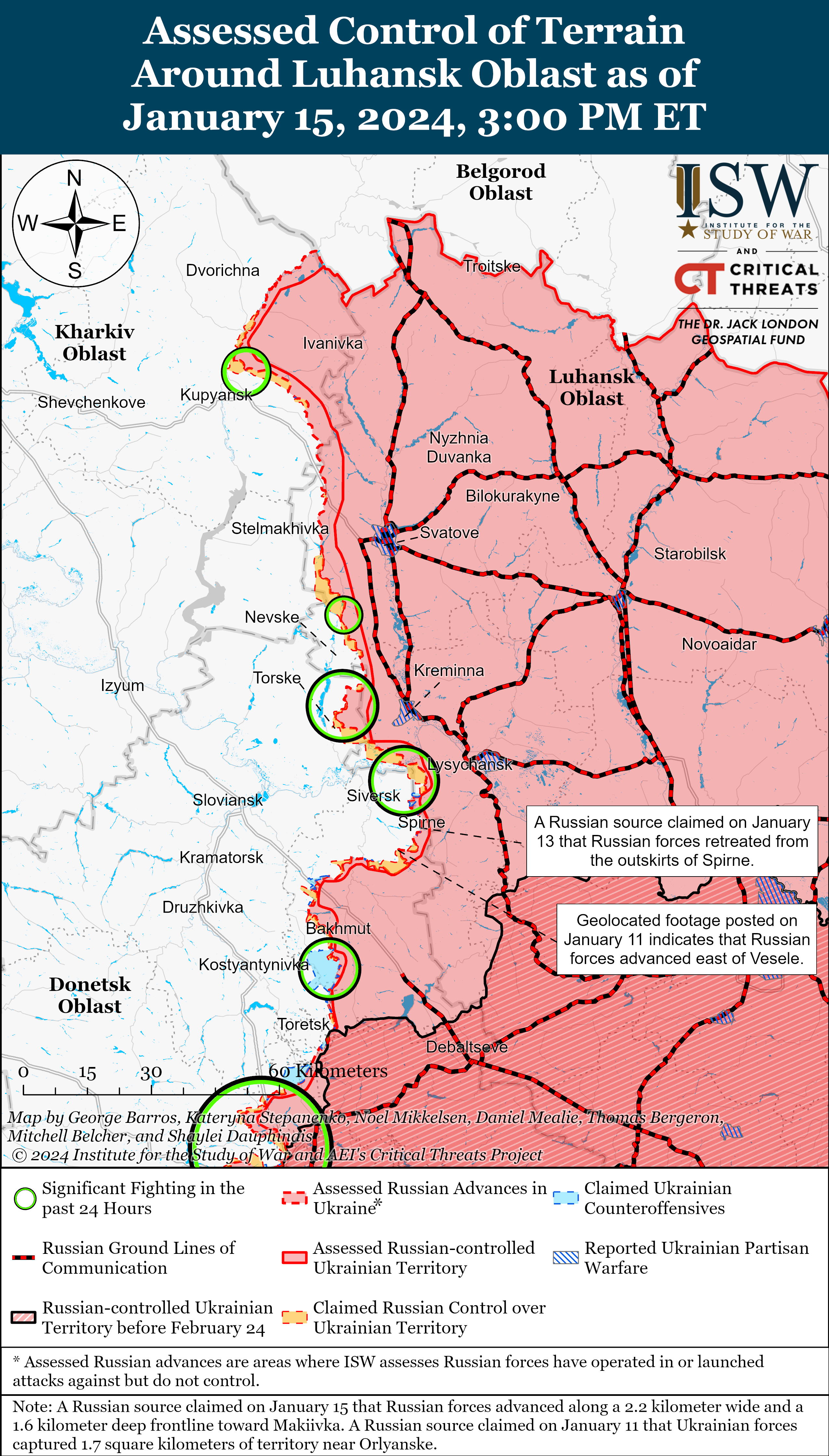
Russian Subordinate Main Effort #2 – Donetsk Oblast (Russian objective: Capture the entirety of Donetsk Oblast, the claimed territory of Russia’s proxies in Donbas)
Positional fighting continued east and southeast of Siversk near Verkhnokamyanske and Vesele on January 15.[58]
Positional fighting continued near Bakhmut on January 15, but there were no confirmed territorial changes in the area. Positional fighting continued northeast of Bakhmut near Bohdanivka; west of Bakhmut near Ivanivske and Khromove; and southwest of Bakhmut near Klishchiivka and Andriivka.[59] Elements of the Russian 200th Naval Infantry Brigade (Northern Fleet) continue to operate near Bakhmut.[60]
Ukrainian forces reportedly struck a Russian Airborne Forces (VDV) position near Bakhmut. Footage published on January 14 shows a reported VDV position in Donetsk Oblast on fire following a Ukrainian strike, and a Russian soldier claimed that the strike destroyed everything, including supplies for frontline Russian soldiers, a vehicle, and his personal documents.[61]
Positional fighting continued near Avdiivka on January 15, but there were no confirmed changes to the front line. Positional fighting continued near Avdiivka; northwest of Avdiivka near Novobakhmutivka, Stepove; and southwest of Avdiivka near Sieverne, Pervomaiske, and Nevelske.[62] A Russian milblogger claimed that Russian forces advanced 300 meters near the wastewater treatment facility northwest of Avdiivka, but ISW is unable to confirm this claim.[63] A Ukrainian brigade operating in the area reported that former remnants of the Wagner private military company (PMC) are operating in the Avdiivka direction.[64]
Footage published on January 15 shows Ukrainian forces striking a Russian vehicle carrying ammunition across a bridge on the E50 Avdiivka-Donetsk City highway northwest of Pisky (southwest of Avdiivka).[65] The strike detonated the ammunition in the Russian vehicle, collapsing one side of the bridge.
Russian forces marginally advanced west of Donetsk City as of January 15. Geolocated footage published on January 15 shows that Russian forces advanced on the eastern outskirts of Heorhiivka (west of Donetsk City), and Russian milbloggers similarly claimed that Russian forces advanced on Heorhiivka’s outskirts.[66] Positional fighting continued west and northwest of Donetsk City near Krasnohorivka, Heorhiivka, Marinka, and Pobieda; and southwest of Donetsk City near Novomykhailivka.[67] Elements of the Russian 68th Army Corps (Eastern Military District) reportedly continue to operate near Novomykhailivka.[68]
Russian Supporting Effort – Southern Axis (Russian objective: Maintain frontline positions and secure rear areas against Ukrainian strikes)
Limited positional engagements continued in the Donetsk-Zaporizhia Oblast border area on January 15, but there were no changes on the frontline.[69] Russian forces reportedly attacked west of Staromayorske (south of Velyka Novosilka), near Chervone (southwest of Velyka Novosilka), and in the direction of Prechystivka (southeast of Velyka Novosilka).[70]
Russian and Ukrainian forces continued positional engagements in western Zaporizhia Oblast on January 15 despite poor weather in the area. Positional engagements continued near Robotyne and west of Verbove (east of Robotyne).[71] North Ossetian “Storm Ossetia” and “Alania” volunteer battalions claimed that Russian forces made marginal gains near Verbove, but ISW has not observed visual confirmation of this claim.[72] Russian milbloggers claimed that Ukrainian drone activity in the Robotyne area decreased due to poor weather conditions but that Russian and Ukrainian artillery fire did not decrease.[73] Elements of the Russian BARS-11 “Kuban” detachment (Russian Combat Army Reserve) and Russian Ministry of Defense’s (MoD) Unmanned Rapid Response Unit “Bobr” are reportedly operating in the Zaporizhia direction.[74] Drone operators of the Russian 429th Motorized Rifle Regiment (19th Motorized Rifle Division, 58th Combined Arms Army, Southern Military District [SMD]) are reportedly operating near Zherebyanky (30km northwest of Robotyne).[75]
Ukrainian Melitopol Mayor Ivan Fedorov reported on January 14 that there were unspecified explosions in occupied Melitopol.[76]
Russian forces recently marginally advanced in western Krynky in east (left) bank Kherson Oblast. Geolocated footage published on January 15 shows that Russian forces advanced northward to the shoreline in western Krynky.[77] Ukrainian forces maintain their positions in east bank Kherson Oblast as of January 15, and limited positional battles continued near Krynky.[78] Russian sources claimed that freezing weather conditions are inhibiting Ukrainian boat movements and landings on the east bank because the Dnipro and Konka rivers and channels are frozen.[79]
Ukrainian Crimean-based partisan group “Atesh” reported on January 15 that its partisans successfully infiltrated the positions of the Russian 18th Guards Anti-Aircraft Missile Regiment (31st Air Defense Division) in occupied Feodosia, Crimea.[80] Ukrainian President’s Mission in Crimea reported on January 15 that Atesh partisans discovered Russian positions 15km from Yevpatoria, Crimea.[81]
Russian Mobilization and Force Generation Efforts (Russian objective: Expand combat power without conducting general mobilization)
The Donetsk People’s Republic (DNR) is reportedly forming a women’s drone operating detachment.[82] Commander of a DNR UAV detachment “Goodwin” announced on January 15 that the DNR has already recruited two women into the unnamed UAV detachment. “Goodwin” claimed that he and his fellow servicemen had already trained over 1,000 drone operators since 2015 and noted that he is recruiting women who demonstrate innate accuracy.
The Ukrainian President’s Mission in Crimea reported on January 15 that Russian forces established a training camp at an old winery in occupied Crimea that has been closed for a long time.[83] The mission noted that there are up to 120 personnel inside the training camp, up to five trucks transporting Russian personnel and ammunition, and two other trucks.
Russian Technological Adaptations (Russian objective: Introduce technological innovations to optimize systems for use in Ukraine)
Russian Eastern Group of Forces personnel are reportedly testing unspecified new strike and reconnaissance first-person view (FPV) drones in Ukraine.[84] An unnamed Russian defense industrial base (DIB) representative noted that it is important to test new drones in combat to see how they interact with Ukrainian electronic warfare (EW).[85] The Russian Ministry of Defense (MoD) stated that the Russian military will soon transfer these drones to the frontline.[86]
Russian Prime Minister Mikhail Mishustin announced on January 15 that the Russian government approved a program to expand domestic aircraft, engine, and flight instrument production.[87] Mishustin stated that the Russian government will draw funds from the National Welfare Fund to finance expanding aircraft production, increasing the production capacity of existing factories, and creating a new materials and electronic component base.[88]
Ukrainian military researcher Andriy Tarasenko stated on January 13 that Russian defense enterprise Uraltransmash is unlikely to begin serial production of Koalitsiya-SV self-propelled guns due to limited production capacity.[89] Tarasenko stated that Uraltransmash will likely focus on repairing and modernizing Msta-S self-propelled guns and finishing its work on Koalitsiya-SV system prototypes.[90] Russian sources claimed that Russian state-owned defense enterprise Rostec delivered an unspecified number of Koalitsiya-SV systems to the Russian military at the end of 2023.[91] Russian state-affiliated outlet Top War stated on January 13 that Russian Deputy Prime Minister and Minister of Trade and Industry Denis Manturov visited unspecified Russian defense enterprises in Sverdlovsk Oblast to check their progress on producing Koalitsiya-SV systems.[92]
Ukrainian Defense Industrial Efforts (Ukrainian objective: Develop its defense industrial base to become more self-sufficient in cooperation with US, European, and international partners)
Click here to read ISW’s new analysis on Ukrainian long-term efforts to develop a self-sufficient DIB with US and European support.
The Ukrainian Ministry of Strategic Industries and the Estonian Defense and Aerospace Industry Association signed a cooperation agreement on January 14 that covers the development and transfer of new technology between both countries and will allow for direct access between the Estonian defense industry and Ukrainian state institutions.[93] The Estonian Defense and Aerospace Industry Association stated that 10 Estonian defense industry companies are already operating in Ukraine.[94]
Ukraine’s “Army of Drones” initiative announced on January 15 that Ukrainian engineers developed armor-piercing EFP-S ammunition for first-person view (FPV) drones that is effective against lightly armored vehicles.[95] The EFP-S ammunition reportedly weighs 165 grams, has a speed of 1,800 meters/second, and a blast radius of eight meters.
Ukrainian Digital Transformation Minister Mykhailo Fedorov stated on January 10 that the Ukrainian government’s Brave1 platform developed the UTE MT-1 mobile firing point with a mounted large-caliber machine gun that Ukrainian operators can remotely control. Fedorov stated that Ukraine has already tested the mobile firing point at Ukrainian training grounds and that a Brave1 grant will finance the production of two improved versions of the UTE M-1.[96]
United Kingdom (UK) Defense Secretary Grant Shapps stated on January 15 that the UK has trained over 60,000 Ukrainian military personnel since 2014 and that over 20 countries have joined the UK’s and Norway’s naval coalition “to defend Ukraine’s maritime flank” since December 2023.[97]
Activities in Russian-occupied areas (Russian objective: Consolidate administrative control of annexed areas; forcibly integrate Ukrainian citizens into Russian sociocultural, economic, military, and governance systems)
The Ukrainian Main Military Intelligence Directorate (GUR) stated that Ukrainian resistance forces detonated a Russian military UAZ Patriot vehicle in occupied Melitopol, Zaporizhia Oblast, injuring four Russian personnel and killing an unspecified number of personnel.[98]
Russian authorities continue efforts to integrate occupied Ukraine into Russia’s education system, society, and culture. Russian Education Minister Sergei Kravstov stated during a meeting with Russian President Vladimir Putin on January 15 that Russia plans to integrate occupied Ukrainian territories into the Russian education system as much as possible between 2024 and 2026. Kravstov stated that Russian authorities have supplied libraries in occupied Ukraine with 1.3 million Russian books and have renovated 683 schools.[99] Sevastopol occupation governor Mikhail Razvozhaev claimed on January 15 that the Russian Presidential Grant Fund will provide 58 million rubles ($661,200) to 22 Sevastopol non-profits to implement programs, including those aimed at the patriotic education of children.[100] Luhansk People’s Republic (LNR) Head Leonid Pasechnik claimed on January 15 that the Russian Presidential Fund for Cultural Initiatives provided about 740 million rubles ($8.4 million) to 956 cultural and sports institutions in occupied Luhansk Oblast in 2023.[101]
Kremlin-affiliated organizations and Russian federal subjects continue to establish patronage networks with territories in occupied Ukraine. Bryansk Oblast Governor Alexander Bogomaz stated in an interview with Kremlin newswire TASS on January 15 that Bryansk Oblast has invested 1.2 billion rubles ($13.6 million) in the restoration of occupied Bryanka, Luhansk Oblast since 2022.[102] The Kherson Oblast occupation administration stated on January 15 that United Russia’s “People‘s Program“ and the Kabardino-Balkarian Republic supported the construction of a medical facility in occupied Mykhailivka, Kherson Oblast.[103]
Russian authorities continue efforts likely aimed at collecting data on Ukrainian citizens and boosting alleged voter numbers in the March 2024 presidential election. The Kherson Oblast occupation administration stated on January 15 that residents do not need a Russian passport to vote in the upcoming Russian presidential election and that a Ukrainian passport, identification card, residential registration, or other official Ukrainian documents are sufficient.[104]
Russian Information Operations and Narratives
Russian President Vladimir Putin and the Kremlin continued their efforts to court Russian constituencies that are affected by Russia’s full-scale invasion of Ukraine ahead of the March presidential elections. Putin spoke at the “Together We Will Win” forum for veterans of the Russian war in Ukraine on January 15 and emphasized the importance of developing a veterans’ movement, strengthening social guarantees for veterans, and expanding medical and rehabilitation programs.[105] Putin also noted the importance of involving veterans in educating the Russian youth as well as promoting humanitarian, educational, outreach, and volunteer projects. A Kremlin-affiliated milblogger reported that the second forum of the Russian Defenders of the Fatherland Foundation dedicated to helping veterans return to civilian life occurred in Moscow on January 15.[106] The milblogger claimed that First Deputy Chief of Staff of the Russian Presidential Administration Sergey Kiriyenko and Russian Deputy Prime Minister for Social Policy, Labor, Health, and Pension Provision Tatyana Golikova attended the forum.[107]
The Russian Ministry of Defense (MoD) reiterated its usual false accusations that the United States and the West are involved in military-biological activities as part of ongoing efforts to spread conspiracy theories about pharmaceutical companies.[108] The Russian MoD claimed that the US Executive Branch is forming a legislative framework to finance military-biological research from the federal budget with Big Pharma companies and to attract funding from non-governmental organizations. ISW has previously reported on the Kremlin’s use of Covid-19 pandemic information operations to advance its political objectives in Ukraine, the West, and around the globe.[109]
Significant Activity in Belarus (Russian efforts to increase its military presence in Belarus and further integrate Belarus into Russian-favorable frameworks and Wagner Group activity in Belarus)
The Belarusian Ministry of Defense (MoD) announced on January 15 that unspecified Belarusian military personnel are undergoing training in Russia to learn from Russian forces’ experience fighting in Ukraine.[110] The Belarusian MoD stated that these Belarusian military personnel will train other Belarusian troops after returning from Russia.[111]
Note: ISW does not receive any classified material from any source, uses only publicly available information, and draws extensively on Russian, Ukrainian, and Western reporting and social media as well as commercially available satellite imagery and other geospatial data as the basis for these reports. References to all sources used are provided in the endnotes of each update.
[3] https://armyinform dot com.ua/2024/01/15/czil-znyshhena-reanimacziya-ne-dopomozhe-yurij-ignat-pro-urazhenyj-rosijskyj-il-22/
[6] https://armyinform dot com.ua/2024/01/15/chuttyevyj-udar-u-sylah-oborony-ukrayiny-poyasnyly-naslidky-znyshhennya-rosijskogo-a-50/
[8] https://armyinform dot com.ua/2024/01/15/ekspert-oczinyv-vtraty-ekipazhu-znyshhenogo-a-50-vks-rosiyi/
[15] https://www.rbc dot ua/ukr/news/vadim-skibitskiy-rosiyan-e-motivatsiya-voyuvati-1705266418.html
[16] https://armyinform dot com.ua/2024/01/15/suvora-dijsnist-skilky-shhe-vtrat-mozhe-vytrymaty-rosijska-armiya/
[19] https://www.rbc dot ua/rus/news/vadim-skibitskiy-rosiyan-e-motivatsiya-voyuvati-1705266418.html
[20] https://www.rbc dot ua/rus/news/vadim-skibitskiy-rosiyan-e-motivatsiya-voyuvati-1705266418.html
[21] https://www.rbc dot ua/rus/news/vadim-skibitskiy-rosiyan-e-motivatsiya-voyuvati-1705266418.html
[22] https://www.rbc dot ua/ukr/news/vadim-skibitskiy-rosiyan-e-motivatsiya-voyuvati-1705266418.html
[23] https://www.rbc dot ua/ukr/news/vadim-skibitskiy-rosiyan-e-motivatsiya-voyuvati-1705266418.html
[25] https://www.rbc dot ua/ukr/news/vadim-skibitskiy-rosiyan-e-motivatsiya-voyuvati-1705266418.html
[26] https://www.rbc dot ua/ukr/news/vadim-skibitskiy-rosiyan-e-motivatsiya-voyuvati-1705266418.html
[27] https://www.rbc dot ua/ukr/news/vadim-skibitskiy-rosiyan-e-motivatsiya-voyuvati-1705266418.html
[28] https://www.rbc dot ua/ukr/news/vadim-skibitskiy-rosiyan-e-motivatsiya-voyuvati-1705266418.html
[30] https://www.rbc dot ua/ukr/news/vadim-skibitskiy-rosiyan-e-motivatsiya-voyuvati-1705266418.html
[36] https://armyinform dot com.ua/2024/01/15/ukrayina-ta-shvejczariya-rozpochaly-pidgotovku-do-globalnogo-samitu-myru-volodymyr-zelenskyj-zaklykav-kytaj-do-uchasti/
[37] https://suspilne dot media/661280-pracuemo-nad-patma-punktami-formuli-miru-ermak-pro-zustric-v-davosi/?utm_source=copylink&utm_medium=ps
[39] https://suspilne dot media/661886-u-davosi-pogodili-spilne-komunike-ukraini-ta-svejcarii-minust/
[40] https://armyinform dot com.ua/2024/01/15/volodymyr-zelenskyj-prybuv-do-shvejczariyi-z-robochym-vizytom/; https://armyinform dot com.ua/2024/01/15/volodymyr-zelenskyj-nagolosyv-na-vazhlyvosti-uchasti-shvejczariyi-u-trybunali-proty-rf/; https://www.president dot gov.ua/news/prezident-ukrayini-zustrivsya-z-golovami-oboh-palat-i-golova-88341
[41] https://armyinform dot com.ua/2024/01/15/shvejczariya-planuye-vydilyty-15-mlrd-frankiv-na-vidnovlennya-ukrayiny/
[42] https://armyinform dot com.ua/2024/01/14/ombudsman-lubinecz-u-davosi-porushyv-pytannya-povernennya-ukrayinskyh-vijskovopolonenyh/
[46] https://www.rbc dot ua/ukr/news/vadim-skibitskiy-rosiyan-e-motivatsiya-voyuvati-1705266418.html
[92] https://topwar dot ru/234121-glava-minpromtorga-rf-proveril-hod-proizvodstva-sau-koalicija-sv-na-odnom-iz-predprijatij-urala.html
[98] https://gur dot gov.ua/content/syly-oporu-u-melitopoli-pidirvaly-okupantiv-razom-z-tekhnikoiu.html


